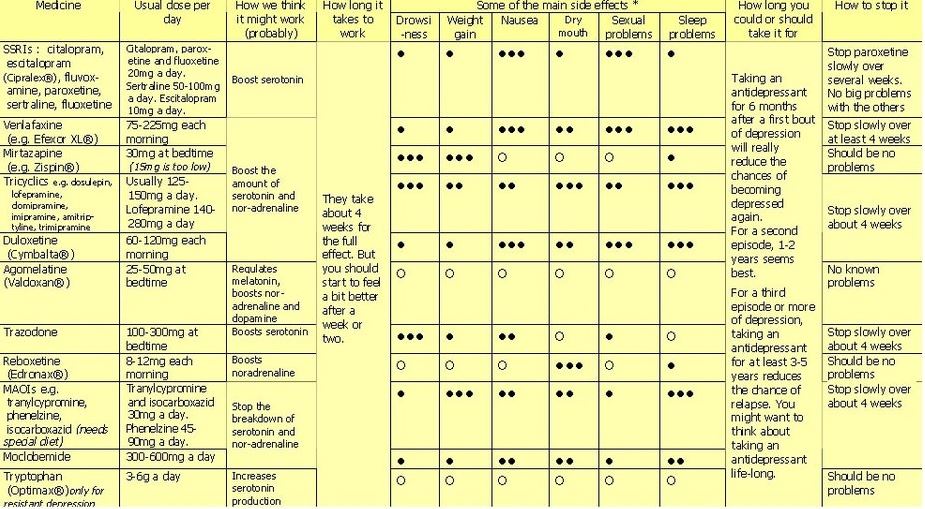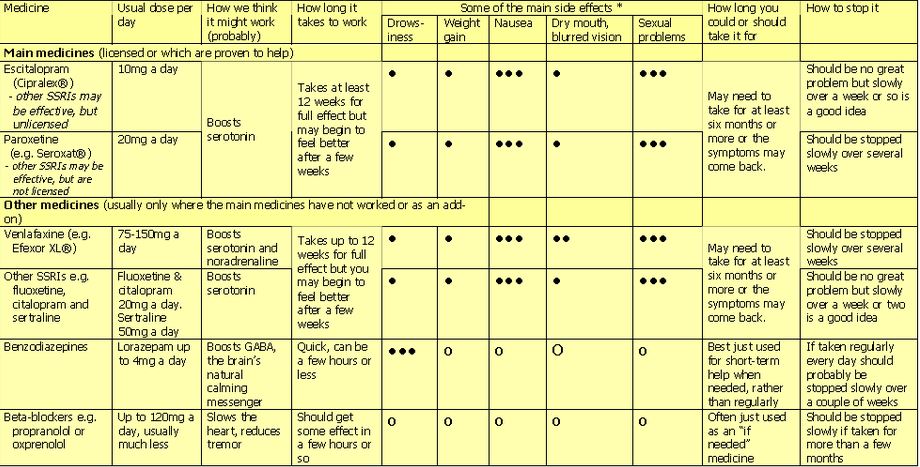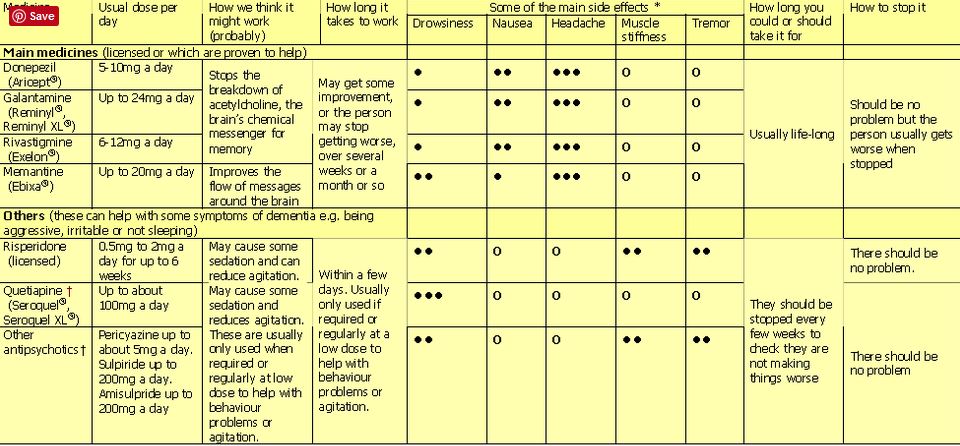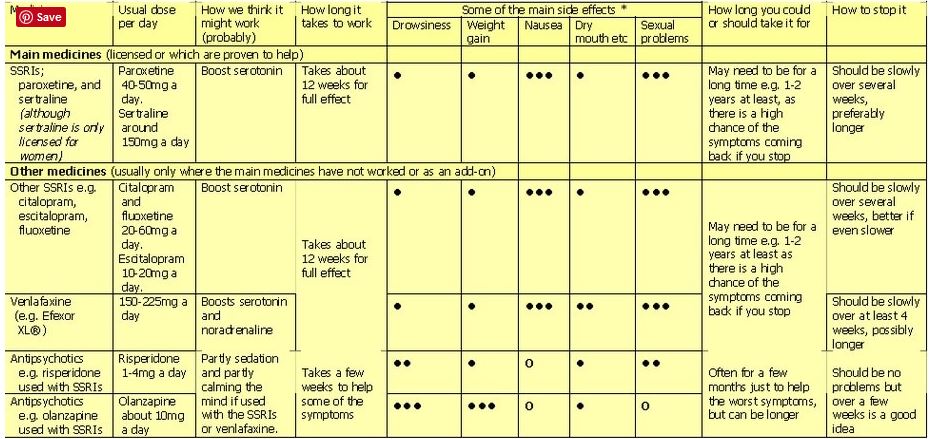Mental Health Issues and Medication Breakdown
**Disclaimer: The information on this page is informational only. It does not constitute medical recommendations. Before using any medication, consult with your medical provider.**
Below are some common mental health issues, and the medications frequently used for treatment.
Depression
Depression is the most common mental health condition in the United States. A persistent negative mood disorder, depression includes feelings of sadness and loss of interest. More than just feeling low, depression is an emotional down that you just can't "snap out of."
Clinical depression may require long-term psychotherapy, medication, or both. Symptoms can start with a trigger event, but neurochemical changes in the brain can cause symptoms to persist even when the trigger is gone.
Drugs for Depression
Anti-depressant drugs:
**Disclaimer: The information on this page is informational only. It does not constitute medical recommendations. Before using any medication, consult with your medical provider.**
Below are some common mental health issues, and the medications frequently used for treatment.
Depression
Depression is the most common mental health condition in the United States. A persistent negative mood disorder, depression includes feelings of sadness and loss of interest. More than just feeling low, depression is an emotional down that you just can't "snap out of."
Clinical depression may require long-term psychotherapy, medication, or both. Symptoms can start with a trigger event, but neurochemical changes in the brain can cause symptoms to persist even when the trigger is gone.
Drugs for Depression
Anti-depressant drugs:
- TCAs - Tricyclic antidepressants (named for specific chemical compounds that act on depressive affect).
- SSRIs - Selective serotonin reuptake inhibitors; keeps serotonin in the brain
- SNRIs - Serotonin-nerepinephrine reuptake inhibitors; keeps serotonin and nortryptiline in the brain.
- MAOIs - MonoAmine oxidase inhibitors; susstains neurotransmitters norepinephrine, serotonin, and dopamine in the brain.
Anxiety
Anxiety is a persistent feeling of tension, worried thoughts, or sense of impending dread. Anxiety can amplify physical health problems like increasing blood pressure.
Anxiety disorders are linked to recurring intrusive thoughts or concerns. People with anxiety disorder may avoid situations out of worry, or may report physical symptoms of stress for no apparent reason such as sweating, trembling, dizziness or a rapid heartbeat.
Drugs for Anxiety
Anti-anxiety drugs:
Anxiety is a persistent feeling of tension, worried thoughts, or sense of impending dread. Anxiety can amplify physical health problems like increasing blood pressure.
Anxiety disorders are linked to recurring intrusive thoughts or concerns. People with anxiety disorder may avoid situations out of worry, or may report physical symptoms of stress for no apparent reason such as sweating, trembling, dizziness or a rapid heartbeat.
Drugs for Anxiety
Anti-anxiety drugs:
- SSRIs - Selective serotonin reuptake inhibitors; keeps serotonin in the brain.
- Benzodiazepines - Specialized barbituates that produce feelings of calm and relaxation.
- Beta-Blockers - block receptor sites for epinephrine (adrenaline, noradrenaline) beta receptors. These drugs inhibit the sympathetic nervous system, which mediates the fight-or-flight response.
Attention Deficit (Hyperactivity) Disorder (ADHD)
Attention-deficit/hyperactivity disorder (ADHD) is marked by in-attention and/or hyperactivity and impulsivity that interferes with daily functioning.
Signs and symptoms of ADHD:
Medications for for ADHD
Schizophrenia
A chronic mental disorder where a breakdown between thought, emotion, and behavior is observed. Faulty perception such as paranoia, inappropriate actions and feelings (such as incessant talking to no one), withdrawal from reality away from personal relationships is common. A person might be engulfed in a fantasy or delusion. In severe cases, mental fragmentation can occur.
Drugs for Schizophrenia
Alzheimer's Disease (AD) or Dementia
Alzheimer's disease is a type of dementia. Dementia is diminishing cognitive function and the progress of cognitive decline is more drastic/precipitous than what one might expect in normal aging. There can also be other features of dementia including personality changes, substantial forgetting (not remembering the name of a spouse or child) abstract reasoning deficit (not understanding there is a glass window separating the inside of a house and the outside because the window is transparent).
Drugs for Dementia
Attention-deficit/hyperactivity disorder (ADHD) is marked by in-attention and/or hyperactivity and impulsivity that interferes with daily functioning.
Signs and symptoms of ADHD:
- Inattention: A person wanders off task, lacks persistence, has difficulty focusing, is disorganized; not due to defiance or lack of comprehension.
- Hyperactivity: A person moves about constantly, even when it's not appropriate, fidgets, taps, or talks constantly. This can wear out people around the person.
- Impulsivity: A person makes hasty actions in the moment without considering the consequences. An impulsive person may be socially awkward by interrupting without forethought.
Medications for for ADHD
Schizophrenia
A chronic mental disorder where a breakdown between thought, emotion, and behavior is observed. Faulty perception such as paranoia, inappropriate actions and feelings (such as incessant talking to no one), withdrawal from reality away from personal relationships is common. A person might be engulfed in a fantasy or delusion. In severe cases, mental fragmentation can occur.
Drugs for Schizophrenia
- Typical Antipsychotics - Diminish dopaminergic activity in the brain. It is believe that too much dopamine produces hallucinations and delusions.
- Atypical antipsychotics - Impact the brain limbic system and the pre-frontal cortex which mediates impulsivity and poor decisionmaking.
Alzheimer's Disease (AD) or Dementia
Alzheimer's disease is a type of dementia. Dementia is diminishing cognitive function and the progress of cognitive decline is more drastic/precipitous than what one might expect in normal aging. There can also be other features of dementia including personality changes, substantial forgetting (not remembering the name of a spouse or child) abstract reasoning deficit (not understanding there is a glass window separating the inside of a house and the outside because the window is transparent).
Drugs for Dementia
- Acetylcholine Uptake Inhibitors - Enhance acetylcholinergic receptor action in the brain.
- Calcium Channel Blockers - Prevent calcium from entering cells of the heart and blood vessel walls widening arteries, enhancing blood flow.
- Antipsychotics - Diminish impulsivity, unwanted behavior by decreasing dopiminergic receptor action in the brain.
Post-Traumatic Stress Disorder (PTSD)
PTSD is a mental health disorder that some people develop after experiencing or witnessing a life-threatening event, like combat, a natural disaster, a car accident, or a sexual assault.
Although it's normal should this occur to experience upsetting memories, feel on edge, or have trouble sleeping, most people feel better after a few weeks or less than a month. If it's been longer than a month that such symptoms persist, this may be PTSD. For some people, PTSD symptoms may start later on, or they may come and go over time.
Drugs for PTSD
PTSD is a mental health disorder that some people develop after experiencing or witnessing a life-threatening event, like combat, a natural disaster, a car accident, or a sexual assault.
Although it's normal should this occur to experience upsetting memories, feel on edge, or have trouble sleeping, most people feel better after a few weeks or less than a month. If it's been longer than a month that such symptoms persist, this may be PTSD. For some people, PTSD symptoms may start later on, or they may come and go over time.
Drugs for PTSD
- SSRIs - Selective serotonin reuptake inhibitors; keeps serotonin in the brain.
- Typical Antipsychotics - Diminishes impulsivity, and unwanted behavior by decreasing dopiminergic receptor action in the brain.
Insomnia
Insomnia is difficulty falling asleep or staying asleep or feeling dissatisfied with sleep. The consequences of insomnia are:
- fatigue
- low energy
- difficulty concentrating
- mood disturbances
- diminished performance at work or school
Specific types of insomnia:
Acute states (something keeps you up) or chronic states (can't fall asleep over long periods of time). Chronic states might be due to shift work for example (waking up, but then can't return to sleep). Insomnia is linked to depression, anxiety, schizophrenia, PTSD and other psychiatric disorders.
Drugs for Insomnia
- Hypnotic Sedatives - Increase the activity of gamma-aminobutyric acid (GABA), a neurotransmitter in the brain which is associated with sleep.
- Selected Tricyclics - Drowsiness is a side effect of early tricyclic medication (Trazadone, Amitryptiline). What causes this drowsiness effect has not been determined, but likely it is how these drugs regulate serotonin or dopamine, two neurotransmitters implicated in sleep.
- Benzodaizepines - Increases the efficiency of synaptic transmission of the neurotransmitter GABA (a neurotransmitter) in the Central Nervous System.
- Diurnal Cycle facilitators - Naturally occurring hormones (Melatonin) that regulate mamilian night and day sleep-wake cycles. Melatonin is synthesized and administered in pill form.
- Antihistimines - Agents that block the action of histamine H1 receptor (benadryl), these agents block histamine's effect on wakefulness. When histamine is blocked the brain perceives this as "sleep mode" and a temporary drowsy feeling ensues that can result in sleep.
Discontinuation Use Syndrome
This syndrome is mile and reversible physical symptoms including:
- cramps
- sweating excessively
- trouble sleeping
- dizziness, tremors
- hypersensitivity to sound
- a feeling that resembles an electric shock to the head
It can appear when approximately 90% of the drug is out of the system.
Discontinuation symptoms could also include anxiety and depression. Since these may be the reason a person was prescribed medication in the first place, their reappearance may suggest a relapse and the need for ongoing medication treatment.
How to distinguish temporary discontinuation symptoms from relapse are as follows.
Discontinuation symptoms:
- Appear within ten days to weeks of stopping or lowering medication dose; relapse symptoms develop more gradually.
- Can include temporary physical complaints that aren't found in depression, such as dizziness and flu-like symptoms.
- Disappear quickly, while the drug treatment for depression takes weeks to work.
- Resolve as the body readjusts to being without the medication, while recurrent depression continues or may get worse.
Ceasing antidepressants should be planned between you and your prescriber. For quitting, you and your prescriber should take steps to minimize discontinuation that could occur if drugs are withdrawn too quickly.
Additional Information and Resources on Discontinuation Use Syndrome:
Drug Discontinuation Information
*The below items go in the order of: 1. drug's name, 2. 50% half-life, 3. 99% half-life*
Paxil, 24 hrs, 4.4 days
Zoloft, 26 hrs, 5.4 days
Lexapro, 27 hrs, 6.1 days
Celexa, 36 hrs, 7.3 days
Prozac, 5 days, 25 days
Effexor, 5 hrs, 25 days
Cymbalta, 12 hrs, 2.5 days
Pristi, 12 hrs, 2.5 days
Wellbutrin, 21 hrs, 4.4 days
*(Information was adapted from Joseph Glenmullen, M.D., The Antidepressant Solution: A Step-by-Step Guide to Safely Overcoming Antidepressant WIthdrawal, Dependence, and "Addiction" (Free Press, 2006).*
Stopping Antidepressants
Take your time and stay on the medication for six to nine months before considering going off it.
Make a plan and reduce the dosage in increments.
Consider therapy. People who undergo psychotherapy while discontinuing are less likely to have a relapse.
(*For more information on this, see Harvard Medical School, Harvard Health Publications, October 27, 2015, Published November 2010.*)
Antidepressant Treatment Tachyphylaxis
This is something that can come up with patients using medication, specifically with SSRIs. The term "Prozac poop-out" is used because a relapse of depression symptoms rebound. This in turn leads a medication user to feeling fatigued or "pooped-out" because the medication has ceased being effective.
According to verywell, other SSRI's involved with Prozac poop-out are:
- Zoloft
- Paxil
- Celexa
- Lexapro
It is important to note that taking anti-depressants isn't necessarily a fix-all remedy to your symptoms. In fact, WebMD further explains the ups and downs of depression. Take a quick read if you are interested to learn more about the ups and downs involved with depression and medication use.
The best thing to do is talk to your provider, doctor, or therapist regarding your questions and concerns.
You can read up on the links that have been provided, but the best practice is to get professional insight into using and discontinuing medication, especially if something doesn't feel quite right during medication use - whether they are side effects that are uncomfortable, or something like Prozac poop-out.
**Disclaimer: The information on this page is informational only. It does not constitute medical recommendations. Before using any medication, consult with your medical provider.**
Information last updated on: 7-24-17



